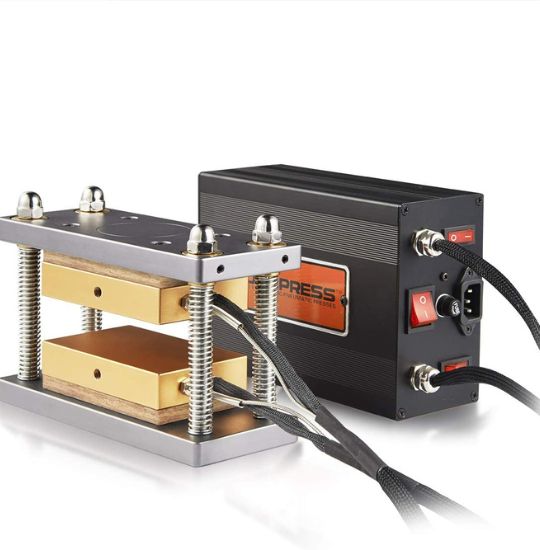How to Decide What Press to Pair with A Rosin Plate Kit?
Posted by DABPRESS CHE

How to decide what press to pair with a rosin plate kit?
There are a number of compatible presses available on the market ranging from 6-ton arbor presses to 50-ton pneumatic presses, and a variety in-between. OK, so there are a lot of options. Where do we start with the decision?
How much space do you have available? Shop presses can take up a lot of space, many of them are floor standing, some are built for bench-top use, others are smaller and function on a pneumatic operation. You will want to decide where you will be pressing. It’s important to have the press in a stable, level area such as a garage or workshop. Please consider the odor generated pressing rosin when deciding where you will set your press up.
Arbor presses are small bench-top manual operated presses generally rated under 6-tons. They are surprisingly expensive the higher in tonnage you get. These presses are good for smaller plates such as 3x3”. Unless you already have access to an arbor press, or just want to use a manual operation press, there are better options if you are still in the planning stage of your build.
Floor standing shop presses typically will range from 6 to 50-ton models, in A or H-Frame. H-Frame presses are considered to be more durable than A-Frame presses. They also offer the most compatibility with the wide range of plate sizes on the market. Due to this, an H-Frame press is recommended. If you do choose to pick an A-frame press, please verify the dimensions of the plates and press to ensure proper clearance and function with your kit.
How much material are you planning on squishing at a time?
If you are squishing for personal consumption, you will be well suited for 3x3” or 3x5” plates. These plates can press 3.5-14 gr (plate size depending) without issue.
If you are squishing for a small commercial operation, you will be more suited for 3x7” or 2.5x7” Dual Plate Sets which are suited more towards 28-42gr.
Depending on how much material you are planning on squishing, you will also need to ensure your press will provide sufficient pressure across the puck.
Notice - Some presses come with a gauge to show how much PSI is being generated, and others do not. If your press does not have a gauge, you will need the practice to understand what the level of pressure feels like. Gauges are a worthwhile investment. We suggest purchasing a press with a gauge to assist you with perfecting and duplicating your rosin extractions.
When doing the calculations of PSI for your press setup, you will want to start out with the max tonnage of your press divided by the the sq/in total of the plates. 1-ton = 2000 lbs and the surface area of the plates is measured by multiplying the Length x Width of the plates.
Let us use the larger 3x7” plates for our first example. If you use a 2.5 x 6.5” rosin filter filled with 28 grams of flowers, this will have a surface area of approx. 16.25 sq/in. If you are wanting to achieve 1400 PSI across the puck, you will need at least a 12-ton press but a 20-ton press would be best as you would not be maxing out your presses payload.
A smaller footprint example would be, 3x3" plates have a total of 9 sq/in on the surface of the plate. If you were using a 6-ton press, this has max 12000 lbs of force available. 12000 lbs divided by 9 sq/in = 1333 lb sq/in of pressure as the maximum payload.
10 to 12-ton presses are available in floor standing or bench-top models, this is a nice common press for most home rosin extractions.
20-ton presses are mostly available in floor standing models, these are great for use in a garage or workshop where you will have more room to process the larger amount of material that a 20-ton press is suited for.
Pneumatic presses can be used and offer some advantages. Leaks with a pneumatic press are not as likely. They are cleaner and generally run off of air compressors with PSI’s between 80-100. They are low maintenance and simple. Because the pneumatic system is dry and does not use fluids, the internal parts are simple and not nearly as expensive. The operation is however loud, so this is a consideration that must be made.
Advisory: When choosing your press, consider purchasing a tonnage that exceeds your desired PSI. Maxing out the payload of your press can decrease the life of your equipment. For this reason, we always suggest looking at more tonnage than you estimate.


